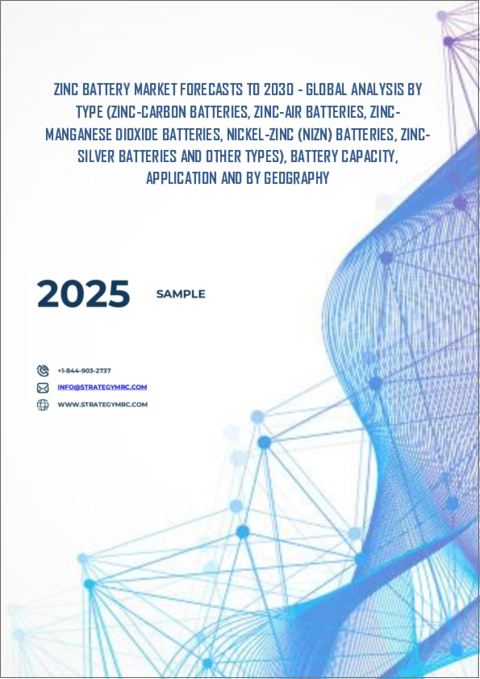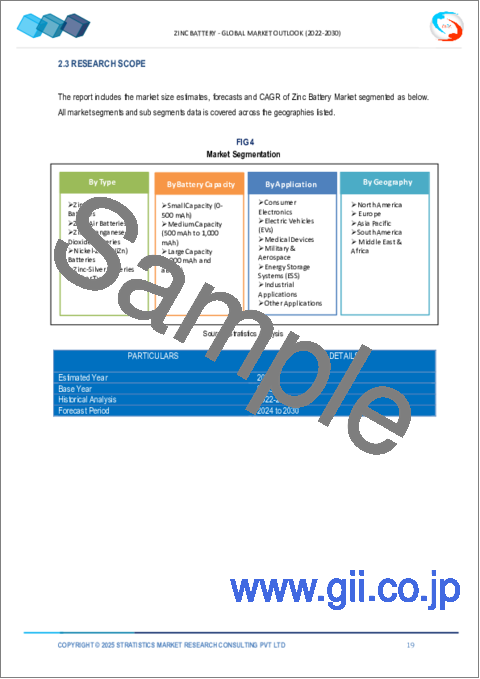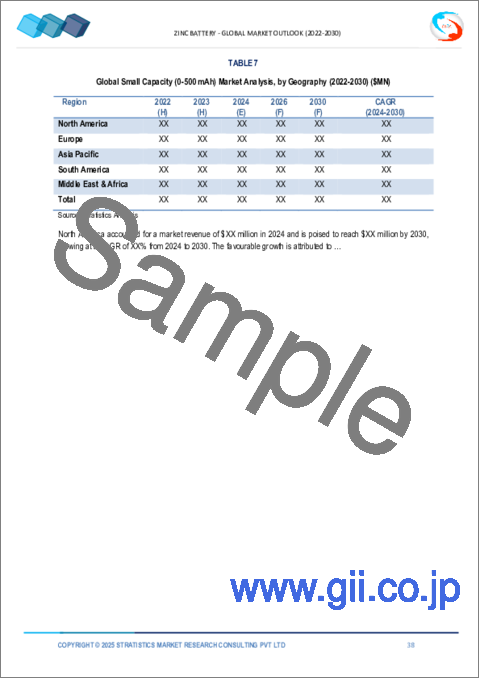|
|
市場調査レポート
商品コード
1569859
亜鉛電池市場の2030年までの予測: タイプ別、電池容量別、用途別、地域別の世界分析Zinc Battery Market Forecasts to 2030 - Global Analysis By Type (Zinc-Carbon Batteries, Zinc-Air Batteries, Zinc-Manganese Dioxide Batteries, Nickel-Zinc Batteries, Zinc-Silver Batteries and Other Types), Battery Capacity, Application and By Geography |
||||||
カスタマイズ可能
|
|||||||
| 亜鉛電池市場の2030年までの予測: タイプ別、電池容量別、用途別、地域別の世界分析 |
|
出版日: 2024年10月10日
発行: Stratistics Market Research Consulting
ページ情報: 英文 200+ Pages
納期: 2~3営業日
|
全表示
- 概要
- 図表
- 目次
Stratistics MRCによると、世界の亜鉛電池市場は2024年に10億米ドルを占め、2030年には23億8,000万米ドルに達すると予測され、予測期間中のCAGRは15.6%です。
亜鉛電池は電気化学電池の一種であり、電池の種類によって陽極に亜鉛、陰極に二酸化マンガンや酸素などの異なる材料を使用します。これらの電池には、空気亜鉛、炭素亜鉛、二酸化マンガン亜鉛、ニッケル亜鉛などさまざまな形態があり、それぞれ価格、効果、環境効果に関して独自の利点があります。
2024年1月に発行された報告書「データセンター2024年世界展望」によると、データセンター事業者はAIや機械学習アプリケーションによって急増する計算要件に対応しようと努力しているため、2027年までに1ラック当たりの平均ラック密度は現在の平均36kWを上回る50kWに急増すると予想されています。
エネルギー貯蔵の需要増加
風力や太陽光などの再生可能エネルギー源の普及が進むにつれ、需給均衡を維持するための信頼性が高く効果的なエネルギー貯蔵システムへの需要が高まっています。亜鉛電池は低コストでエネルギー密度が高く、環境に優しいため、実行可能な選択肢です。亜鉛電池技術の発展と研究開発費の増加により、グリッド規模のエネルギー貯蔵、住宅用エネルギーシステム、ポータブル電子機器など、さまざまな用途でエネルギー貯蔵の需要が高まっており、市場は急成長が見込まれています。
亜鉛電池の利点に関する限られた認識
亜鉛電池の手頃な価格、将来的な用途、環境への優しさといった利点は、多くの消費者や産業界にはあまり知られていません。このため、市場を独占しているリチウムイオン電池のような、より確立された技術が好まれています。この障害を克服するためには、利害関係者にマーケティングや教育プログラムを通じて亜鉛電池の利点や能力を知ってもらい、亜鉛電池の受け入れと使用を増やす必要があります。亜鉛電池業界において、広く受け入れられ採用されるための主な障害は知識不足です。
幅広い用途
亜鉛電池はそのユニークな特性と汎用性により、幅広い用途があります。エネルギー密度が高く、価格も手ごろなため、エネルギー需給のバランスをとる上で競争力のある選択肢となり、グリッド規模のエネルギー貯蔵に理想的です。亜鉛電池は家庭用エネルギーシステムで、太陽光や風力の余剰エネルギーを蓄え、オフピーク時や送電網の不安定時に利用することができます。さらに、亜鉛電池は、ノートパソコンや携帯電話のようなポータブル電子機器において、従来のリチウムイオン電池の代替となりうるものとして研究されています。亜鉛電池は、その適応性の高さから、さまざまなエネルギー貯蔵用途に使用できる有望な技術です。
リサイクルの課題
亜鉛はリサイクル可能ですが、リチウムイオン電池に比べ、亜鉛電池をリサイクルするためのインフラがあまり確立されていないため、電池の廃棄や材料の回収プロセスが非効率的です。回収とリサイクルのメカニズムが確立されていないため、貴重な材料を回収する機会が軽視され、環境廃棄物が増加する可能性があります。これらの問題を解決するためには、リサイクル技術への投資と、業界による亜鉛電池の正確な廃棄とリサイクルを奨励するプログラムが必要です。
COVID-19の影響
亜鉛電池の市場はCOVID-19の流行によって大きな影響を受け、サプライチェーンの混乱と生産量の減少を引き起こしました。亜鉛電池の重要な用途である民生用電子機器と電気自動車の需要は、操業停止と経済不安によってマイナスの影響を受けた。しかし、パンデミックは、特に医療分野において、信頼性が高く長持ちするエネルギー貯蔵技術を見つけることがいかに重要であるかを明らかにしました。亜鉛電池市場は、電池技術の新興経済諸国や、効果的な蓄電ソリューションを必要とする再生可能エネルギー源の利用増加に後押しされ、世界経済の回復とともに成長すると予想されます。
予測期間中は亜鉛-炭素電池セグメントが最大になる見込み
亜鉛-炭素電池セグメントは、おもちゃ、トーチ、リモートコントロール、亜鉛-炭素電池のような低ドレインアプリケーションでの広範な使用により、予測期間中に最大の市場シェアを占めると予測されています。特に一般的な家庭用品の市場が強い地域では、その入手しやすさと低価格が魅力に拍車をかけています。さらに、亜鉛-炭素電池は、製造技術の改善により、より効率的になり、より長い貯蔵寿命を持っています。IoTデバイスの利用が増加しており、これらのデバイスが機能するためには安価で信頼性の高い電源が頻繁に必要となるため、需要が増加しています。
予測期間中、民生用電子機器分野のCAGRが最も高くなる見込み
予測期間中、玩具、懐中電灯、リモコンのような軽量で消耗の少ないガジェットに対する顧客の要望が高まっていることから、民生用電子機器分野が最も高いCAGRで成長すると予想されます。亜鉛電池は、さまざまな電子アプリケーションに効果的な電力ソリューションを提供できることに加え、モノのインターネット(IoT)の急速な拡大と技術の進歩により、ますます人気が高まっています。コンシューマー・エレクトロニクス製品での利用が拡大しているのも、環境に優しいという特質が影響しています。
最大のシェアを占める地域:
予測期間中、アジア太平洋地域が最大の市場シェアを占めると予測されます。信頼性が高くリーズナブルな価格のバッテリーソリューションへのニーズは、同地域の急速な発展と家電需要の高まりによってさらに高まっています。さらに、より環境に優しいエネルギー技術や電池の進歩を支援する政府の積極的な政策によって、市場はさらに刺激されています。亜鉛電池のニーズは、エネルギー貯蔵システムと電気自動車の人気の高まりによって高まっており、アジア太平洋地域はこの業界の最前線に位置しています。
CAGRが最も高い地域:
北米地域は、電気自動車(EV)の人気の高まりと持続可能なエネルギー貯蔵オプションの必要性により、予測期間中に最も高い成長率を記録すると予想されます。亜鉛電池は、持続可能な代替品を求める人々や企業にとって、費用対効果や環境面での利点があるため、ますます人気が高まっています。この地域には大規模な製造業者や研究施設があり、創造性と最先端の電池技術の進歩を後押ししています。また、グリーン・エネルギー・プロジェクトに対する政府の支援や排出規制の強化も、この産業を後押ししています。
無料カスタマイズサービス:
本レポートをご購読のお客様には、以下の無料カスタマイズオプションのいずれかをご利用いただけます:
- 企業プロファイル
- 追加市場プレーヤーの包括的プロファイリング(3社まで)
- 主要企業のSWOT分析(3社まで)
- 地域セグメンテーション
- 顧客の関心に応じた主要国の市場推計・予測・CAGR(注:フィージビリティチェックによる)
- 競合ベンチマーキング
- 製品ポートフォリオ、地理的プレゼンス、戦略的提携に基づく主要企業のベンチマーキング
目次
第1章 エグゼクティブサマリー
第2章 序文
- 概要
- ステークホルダー
- 調査範囲
- 調査手法
- データマイニング
- データ分析
- データ検証
- 調査アプローチ
- 調査情報源
- 1次調査情報源
- 2次調査情報源
- 前提条件
第3章 市場動向分析
- 促進要因
- 抑制要因
- 機会
- 脅威
- 用途分析
- 新興市場
- COVID-19の影響
第4章 ポーターのファイブフォース分析
- 供給企業の交渉力
- 買い手の交渉力
- 代替品の脅威
- 新規参入業者の脅威
- 競争企業間の敵対関係
第5章 世界の亜鉛電池市場:タイプ別
- 亜鉛炭素電池
- 亜鉛空気電池
- 亜鉛マンガン二酸化電池
- ニッケル亜鉛(NiZn)電池
- 亜鉛銀電池
- その他のタイプ
第6章 世界の亜鉛電池市場:電池容量別
- 小容量(0~500mAh)
- 中容量(500mAh~1,000mAh)
- 大容量(1,000mAh以上)
第7章 世界の亜鉛電池市場:用途別
- 家電
- 電気自動車(EV)
- 医療機器
- 軍事・航空宇宙
- エネルギー貯蔵システム(ESS)
- 産業用途
- その他の用途
第9章 世界の亜鉛電池市場:地域別
- 北米
- 米国
- カナダ
- メキシコ
- 欧州
- ドイツ
- 英国
- イタリア
- フランス
- スペイン
- その他欧州
- アジア太平洋
- 日本
- 中国
- インド
- オーストラリア
- ニュージーランド
- 韓国
- その他アジア太平洋地域
- 南米
- アルゼンチン
- ブラジル
- チリ
- その他南米
- 中東・アフリカ
- サウジアラビア
- アラブ首長国連邦
- カタール
- 南アフリカ
- その他中東とアフリカ
第10章 主な発展
- 契約、パートナーシップ、コラボレーション、合弁事業
- 買収と合併
- 新製品発売
- 事業拡大
- その他の主要戦略
第11章 企業プロファイリング
- Energizer Holdings, Inc.
- Duracell Inc.
- GP Batteries International Limited
- Panasonic Corporation
- PowerGenix
- ZPower, LLC
- Zinc8 Energy Solutions
- East Penn Manufacturing Co.
- Primus Power
- Toshiba Corporation
- Arotech Corporation
- Fuji Electric Co., Ltd.
- EverZinc
- Urban Electric Power
- Varta AG
- Exide Technologies
- Johnson Controls International plc
- Saft Groupe S.A.
- Mullen Automotive, Inc.
- NEC Energy Solutions
List of Tables
- Table 1 Global Zinc Battery Market Outlook, By Region (2022-2030) ($MN)
- Table 2 Global Zinc Battery Market Outlook, By Type (2022-2030) ($MN)
- Table 3 Global Zinc Battery Market Outlook, By Zinc-Carbon Batteries (2022-2030) ($MN)
- Table 4 Global Zinc Battery Market Outlook, By Zinc-Air Batteries (2022-2030) ($MN)
- Table 5 Global Zinc Battery Market Outlook, By Zinc-Manganese Dioxide Batteries (2022-2030) ($MN)
- Table 6 Global Zinc Battery Market Outlook, By Nickel-Zinc (NiZn) Batteries (2022-2030) ($MN)
- Table 7 Global Zinc Battery Market Outlook, By Zinc-Silver Batteries (2022-2030) ($MN)
- Table 8 Global Zinc Battery Market Outlook, By Other Types (2022-2030) ($MN)
- Table 9 Global Zinc Battery Market Outlook, By Battery Capacity (2022-2030) ($MN)
- Table 10 Global Zinc Battery Market Outlook, By Small Capacity (0-500 mAh) (2022-2030) ($MN)
- Table 11 Global Zinc Battery Market Outlook, By Medium Capacity (500 mAh to 1,000 mAh) (2022-2030) ($MN)
- Table 12 Global Zinc Battery Market Outlook, By Large Capacity (1,000 mAh and above) (2022-2030) ($MN)
- Table 13 Global Zinc Battery Market Outlook, By Application (2022-2030) ($MN)
- Table 14 Global Zinc Battery Market Outlook, By Consumer Electronics (2022-2030) ($MN)
- Table 15 Global Zinc Battery Market Outlook, By Electric Vehicles (EVs) (2022-2030) ($MN)
- Table 16 Global Zinc Battery Market Outlook, By Medical Devices (2022-2030) ($MN)
- Table 17 Global Zinc Battery Market Outlook, By Military & Aerospace (2022-2030) ($MN)
- Table 18 Global Zinc Battery Market Outlook, By Energy Storage Systems (ESS) (2022-2030) ($MN)
- Table 19 Global Zinc Battery Market Outlook, By Industrial Applications (2022-2030) ($MN)
- Table 20 Global Zinc Battery Market Outlook, By Other Applications (2022-2030) ($MN)
Note: Tables for North America, Europe, APAC, South America, and Middle East & Africa Regions are also represented in the same manner as above.
According to Stratistics MRC, the Global Zinc Battery Market is accounted for $1.00 billion in 2024 and is expected to reach $2.38 billion by 2030 growing at a CAGR of 15.6% during the forecast period. A zinc battery is a kind of electrochemical cell that, depending on the battery type, employs zinc as the anode and different materials, including manganese dioxide or oxygen, as the cathode. These batteries come in a variety of forms, including zinc-air, zinc-carbon, zinc-manganese dioxide, and nickel-zinc, each with unique benefits regarding price, effectiveness, and environmental effect.
According to the report, published in January 2024, Data Centers 2024 Global Outlook, by 2027, the average rack density is anticipated to soar to 50kW per rack, outpacing the present average of 36kW, as data center operators strive to accommodate the surging computational requirements driven by AI and machine learning applications.
Market Dynamics:
Driver:
Increasing demand for energy storage
The increasing prevalence of renewable energy sources such as wind and solar drives the demand for dependable and effective energy storage systems to maintain supply and demand equilibrium. Zinc batteries are a viable option because of their low cost, high energy density, and environmental friendliness. The market is expected to grow quickly in response to the growing demand for energy storage in a variety of applications, such as grid-scale energy storage, residential energy systems, and portable electronics, thanks to developments in zinc battery technology and rising R&D expenditures.
Restraint:
Limited awareness regarding the benefits of zinc batteries
The benefits of zinc batteries, like their affordability, prospective applications, and environmental friendliness, are not widely known to many consumers or industries. Due to this ignorance, more well-established technologies-like lithium-ion batteries, which rule the market-are preferred. In order to get beyond this obstacle, stakeholders must be informed about the advantages and capacities of zinc batteries through marketing and educational programs, which will increase their acceptance and use. In the zinc battery industry, a major obstacle to broad acceptance and adoption is a lack of knowledge.
Opportunity:
Wide range of applications
Zinc batteries have a wide range of applications due to their unique properties and versatility. Their high energy density and affordability make them a competitive choice for balancing the supply and demand of energy, which makes them ideal for grid-scale energy storage. Zinc batteries can be used in household energy systems to store extra solar or wind energy for usage at off-peak times or in the event of grid instability. Furthermore, zinc batteries are being investigated as a possible substitute for conventional lithium-ion batteries in portable electronics like laptops and cellphones. Zinc batteries are a promising technology that can be used to meet a variety of energy storage applications due to their adaptability.
Threat:
Recycling challenges
Zinc is recyclable, however compared to lithium-ion batteries; the infrastructure for recycling zinc batteries is less established which results in inefficient battery disposal and material recovery processes. Neglected chances for reclaiming valuable materials and an increase in environmental waste might arise from the absence of well-established mechanisms for collection and recycling. Investments in recycling technologies and programs that encourage the industry's accurate disposal and recycling of zinc batteries are necessary to meet these problems.
Covid-19 Impact
The market for zinc batteries was significantly impacted by the COVID-19 epidemic, which caused supply chain disruptions and decreased production. The demand for consumer electronics and electric vehicles-two important uses for zinc batteries-was negatively impacted by lockdowns and economic uncertainty. But the pandemic also made clear how important it is to find dependable and long-lasting energy storage technologies, especially for the medical field. The market for zinc batteries is anticipated to grow as the world economy recovers, propelled by developments in battery technology and a rise in the use of renewable energy sources that call for effective storage solutions.
The zinc-carbon batteries segment is expected to be the largest during the forecast period
The zinc-carbon batteries segment is projected to account for the largest market share during the projection period, due to their extensive usage in low-drain applications like toys, torches, and remote controls, zinc-carbon batteries. Their availability and low cost add to their attraction, particularly in areas where there is a strong market for common home goods. Furthermore, zinc-carbon batteries are becoming more efficient and have a longer shelf life because to improvements in manufacturing techniques. The increasing utilisation of IoT devices is driving up demand since they frequently need inexpensive, dependable power sources to function.
The consumer electronics segment is expected to have the highest CAGR during the forecast period
During the projection period, the consumer electronics segment is expected to grow at the highest CAGR, due to growing customer desire for lightweight, low-drain gadgets like toys, torches, and remote controls. Zinc batteries are becoming increasingly popular due to their ability to offer effective power solutions for a variety of electronic applications, as well as the Internet of Things' (IoT) rapid expansion and technological advancements. Their growing use in consumer electronics goods is also influenced by their environmentally favourable qualities.
Region with largest share:
The Asia Pacific region is projected to account for the largest market share during the forecast period. The need for dependable and reasonably priced battery solutions is further increased by the region's fast development and rising demand for consumer electronics. Furthermore, the market is further stimulated by positive government policies that support greener energy technologies and battery progress. The need for zinc batteries is being driven up by the growing popularity of energy storage systems and electric vehicles, which places the Asia-Pacific region at the forefront of this industry.
Region with highest CAGR:
The North America region is expected to register the highest growth rate over the forecast period, owing to the growing popularity of electric vehicles (EVs) and the need for sustainable energy storage options. Zinc batteries are becoming more and more popular because of their cost-effectiveness and environmental advantages as people and companies look for sustainable alternatives. The region's large manufacturers and research facilities encourage creativity and the advancement of cutting-edge battery technologies. The industry is also being driven by government backing for green energy projects and tighter emissions rules.
Key players in the market
Some of the key players profiled in the Zinc Battery Market include Energizer Holdings, Inc., Duracell Inc., GP Batteries International Limited, Panasonic Corporation, PowerGenix, ZPower, LLC, Zinc8 Energy Solutions, East Penn Manufacturing Co., Primus Power, Toshiba Corporation, Arotech Corporation, Fuji Electric Co., Ltd., EverZinc, Urban Electric Power, Varta AG, Exide Technologies, Johnson Controls International plc, Saft Groupe S.A., Mullen Automotive, Inc. and NEC Energy Solutions.
Key Developments:
In March 2022, In January 2022, PowerGenix released an advanced nickel-zinc battery solution tailored for high-performance power tools.
In January 2022, PowerGenix released an advanced nickel-zinc battery solution tailored for high-performance power tools.
In September 2021, Varta launched a new zinc-air battery specifically designed for improved performance in hearing aids.
Types Covered:
- Zinc-Carbon Batteries
- Zinc-Air Batteries
- Zinc-Manganese Dioxide Batteries
- Nickel-Zinc (NiZn) Batteries
- Zinc-Silver Batteries
- Other Types
Battery Capacities Covered:
- Small Capacity (0-500 mAh)
- Medium Capacity (500 mAh to 1,000 mAh)
- Large Capacity (1,000 mAh and above)
Applications Covered:
- Consumer Electronics
- Electric Vehicles (EVs)
- Medical Devices
- Military & Aerospace
- Energy Storage Systems (ESS)
- Industrial Applications
- Other Applications
Regions Covered:
- North America
- US
- Canada
- Mexico
- Europe
- Germany
- UK
- Italy
- France
- Spain
- Rest of Europe
- Asia Pacific
- Japan
- China
- India
- Australia
- New Zealand
- South Korea
- Rest of Asia Pacific
- South America
- Argentina
- Brazil
- Chile
- Rest of South America
- Middle East & Africa
- Saudi Arabia
- UAE
- Qatar
- South Africa
- Rest of Middle East & Africa
What our report offers:
- Market share assessments for the regional and country-level segments
- Strategic recommendations for the new entrants
- Covers Market data for the years 2022, 2023, 2024, 2026, and 2030
- Market Trends (Drivers, Constraints, Opportunities, Threats, Challenges, Investment Opportunities, and recommendations)
- Strategic recommendations in key business segments based on the market estimations
- Competitive landscaping mapping the key common trends
- Company profiling with detailed strategies, financials, and recent developments
- Supply chain trends mapping the latest technological advancements
Free Customization Offerings:
All the customers of this report will be entitled to receive one of the following free customization options:
- Company Profiling
- Comprehensive profiling of additional market players (up to 3)
- SWOT Analysis of key players (up to 3)
- Regional Segmentation
- Market estimations, Forecasts and CAGR of any prominent country as per the client's interest (Note: Depends on feasibility check)
- Competitive Benchmarking
- Benchmarking of key players based on product portfolio, geographical presence, and strategic alliances
Table of Contents
1 Executive Summary
2 Preface
- 2.1 Abstract
- 2.2 Stake Holders
- 2.3 Research Scope
- 2.4 Research Methodology
- 2.4.1 Data Mining
- 2.4.2 Data Analysis
- 2.4.3 Data Validation
- 2.4.4 Research Approach
- 2.5 Research Sources
- 2.5.1 Primary Research Sources
- 2.5.2 Secondary Research Sources
- 2.5.3 Assumptions
3 Market Trend Analysis
- 3.1 Introduction
- 3.2 Drivers
- 3.3 Restraints
- 3.4 Opportunities
- 3.5 Threats
- 3.6 Application Analysis
- 3.7 Emerging Markets
- 3.8 Impact of Covid-19
4 Porters Five Force Analysis
- 4.1 Bargaining power of suppliers
- 4.2 Bargaining power of buyers
- 4.3 Threat of substitutes
- 4.4 Threat of new entrants
- 4.5 Competitive rivalry
5 Global Zinc Battery Market, By Type
- 5.1 Introduction
- 5.2 Zinc-Carbon Batteries
- 5.3 Zinc-Air Batteries
- 5.4 Zinc-Manganese Dioxide Batteries
- 5.5 Nickel-Zinc (NiZn) Batteries
- 5.6 Zinc-Silver Batteries
- 5.7 Other Types
6 Global Zinc Battery Market, By Battery Capacity
- 6.1 Introduction
- 6.2 Small Capacity (0-500 mAh)
- 6.3 Medium Capacity (500 mAh to 1,000 mAh)
- 6.4 Large Capacity (1,000 mAh and above)
7 Global Zinc Battery Market, By Application
- 7.1 Introduction
- 7.2 Consumer Electronics
- 7.3 Electric Vehicles (EVs)
- 7.4 Medical Devices
- 7.5 Military & Aerospace
- 7.6 Energy Storage Systems (ESS)
- 7.7 Industrial Applications
- 7.8 Other Applications
9 Global Zinc Battery Market, By Geography
- 9.1 Introduction
- 9.2 North America
- 9.2.1 US
- 9.2.2 Canada
- 9.2.3 Mexico
- 9.3 Europe
- 9.3.1 Germany
- 9.3.2 UK
- 9.3.3 Italy
- 9.3.4 France
- 9.3.5 Spain
- 9.3.6 Rest of Europe
- 9.4 Asia Pacific
- 9.4.1 Japan
- 9.4.2 China
- 9.4.3 India
- 9.4.4 Australia
- 9.4.5 New Zealand
- 9.4.6 South Korea
- 9.4.7 Rest of Asia Pacific
- 9.5 South America
- 9.5.1 Argentina
- 9.5.2 Brazil
- 9.5.3 Chile
- 9.5.4 Rest of South America
- 9.6 Middle East & Africa
- 9.6.1 Saudi Arabia
- 9.6.2 UAE
- 9.6.3 Qatar
- 9.6.4 South Africa
- 9.6.5 Rest of Middle East & Africa
10 Key Developments
- 10.1 Agreements, Partnerships, Collaborations and Joint Ventures
- 10.2 Acquisitions & Mergers
- 10.3 New Product Launch
- 10.4 Expansions
- 10.5 Other Key Strategies
11 Company Profiling
- 11.1 Energizer Holdings, Inc.
- 11.2 Duracell Inc.
- 11.3 GP Batteries International Limited
- 11.4 Panasonic Corporation
- 11.5 PowerGenix
- 11.6 ZPower, LLC
- 11.7 Zinc8 Energy Solutions
- 11.8 East Penn Manufacturing Co.
- 11.9 Primus Power
- 11.10 Toshiba Corporation
- 11.11 Arotech Corporation
- 11.12 Fuji Electric Co., Ltd.
- 11.13 EverZinc
- 11.14 Urban Electric Power
- 11.15 Varta AG
- 11.16 Exide Technologies
- 11.17 Johnson Controls International plc
- 11.18 Saft Groupe S.A.
- 11.19 Mullen Automotive, Inc.
- 11.20 NEC Energy Solutions






